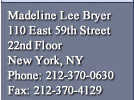|
|
|
|
 |
 Serious Burn Injuries Serious Burn Injuries
Serious burn injuries are among the most painful experiences a person can have. Second and third degree burns often require skin grafting and result in scarring. Such injuries can have many causes: scalding water, radiators, flammable fabrics, and dwellings that fail to have appropriate wiring, fire doors, smoke alarms, and/or window gates. In many cases, the landlord can be held liable if defective conditions cause the injury.
In the United States, more than 112,000 people are treated in emergency rooms each year with scald burns. Almost 3,000 are caused by tap water. In New York, landlords are required to provide heat and hot water. Although landlords are not legally required to provide anti-scald valves in apartment sinks and bathtubs, they have a duty to keep the boiler and hot water system in good repair and to fix any defective condition that causes water to come out of the faucet at scalding temperature. A child exposed to tap water at 140 degrees Fahrenheit for three seconds will be at risk for third degree burns that require hospitalization and skin grafting. If this scalding water is cause to come out of the faucet by a defective condition such as a broken mixing valve, then the landlord, the boiler maintenance company and others may be held liable for damages.
Landlords can also be responsible for burns caused by defective radiators if the landlord knew or should have known about the defect. It should be noted, however, that the landlord has no duty to provide covers for a radiator that is not defective, or to repair a condition that he has no notice of. Thus, it is important to document the existence of a defect in the radiator as well as any complaints made to the landlord.
Faulty wiring, failure to have working smoke alarms or fire doors and improperly installed window gates can often result in serious burn injuries and/or death. Negligently installed electrical wiring can overheat and cause fires. Landlords and/or the installation company may have liability for failing to install or maintain proper electrical wiring.
In New York City, the Administrative Code requires stairwells and elevators to have self closing fire doors with a 1 ½ hour fire protection rating and all doors giving access to interior hallways must have a ¾ hour fire protection rating. Moreover, city law requires that apartment buildings have fire suppression systems that include sprinklers and smoke detectors. If the fire suppression system, fire doors, or gates are defective, then the landlord, installation company, or maintenance company may be liable for injuries caused by fire. In fact, courts have even allowed recovery against the landlord where the fire was the result of arson but the building had defective equipment. To obtain a recovery, however, the burn victim must prove that the absence and/or defects in the smoke alarms, fire doors or sprinklers was a substantial factor in causing the fire to spread. This often requires the testimony of an expert fire investigator. It is important for the expert to visit the premises as soon as possible to obtain an accurate evaluation of the cause of the fire and the condition of the equipment.
Landlords have often been able to defend against these actions by bringing in an expert to testify that the fire had some cause other than the electrical defect, such as cigarettes, matches, improper use of heaters or improper storage of flammable materials. Thus, it is again important to conduct a prompt investigation of the cause of the fire, obtain all relevant Fire Department documents, and get the building inspection reports or other documents to show that the owner was or should have been aware of the fault.
Successful lawsuits can make a difference. Lawsuits have fortunately brought significant changes to the clothing industry. Laws now require fabrics to be treated in compliance with the Flammable Fabrics Act. Untreated cotton retains the gases and then suddenly lights up like a torch. Prior to the Flammable Fabric Act untreated cotton was used in children's pajamas and other types of clothing. Despite passage of this Act, however, clothing can reach the marketplace which does not comply with these standards. Moreover because the flammable fabric standards are so low, cases can also be brought against manufacturers of clothing that are placed into the market that are below the standards in the industry even though they comply with the Federal Flammable Fabric Act.
Because burn injury cases are fact specific anyone suffering a significant burn should contact an attorney to determine what rights they may have. Prompt investigation of the cause of the fire or burn is critical. Moreover, when suing a city, county or town, a notice of claim has to be filed within 90 days after the occurrence. Although the courts can grant permission to file a late notice of claim under certain circumstances, they are not required to do so, and the earlier the notice is filed, the better. It is therefore important to seek legal assistance as soon as possible.
If you or anyone you know has been burned do not hesitate to call the office of Madeline Lee Bryer, P.C. at
(212) 370-0630 for a free consultation.
|
|
|
Attorney Advertising. Prior
Results Do Not Guarantee a Similar Outcome.
Copyright © – Madeline Lee Bryer, P.C. – Attorneys at Law
Serious Injuries, Personal Injury Lawyers, Victims Rights,
Burn Injuries, Lead Poisoning, Burn Injuries, Scald Burns, Violent Crime, Third Degree Burns, Car Accidents,
Wrongful Death, Rape, Sexual Assault, Faulty Designed Products, Medical Malpractice
Website by
Consultwebs.com, Inc. – Law webs for law firms, lawyers
|
|





